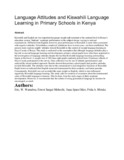Language Attitudes and Kiswahili Language Learning in Primary Schools in Kenya

Date
2020-08Author
Wamalwa, Eric, W.
Mohochi, Ernest Sangai
Odeo, Isaac Ipara
Miruka, Frida A.
Metadata
Show full item recordAbstract
Kiswahili and English are two important languages taught and examined at the national level in Kenya’s education
system. Students’ academic performance in the subjects keeps varying in national examinations. Different from
English, however, poor performance in Kiswahili is more often associated with negative attitudes. Nevertheless,
empirical validations have in most cases, not been established. The present study explores pupils’ attitudes toward
Kiswahili in the context of second language learning in Siaya County of Kenya. The study is anchored on the
assumption that although language attitudes play a big role in second language learning and development, primary
school pupils have often been neglected in the investigation of language attitudes despite the fact that Kiswahili
language learning and teaching begins at that level. A sample size of 360 class eight pupils randomly picked from
18 primary schools of Siaya County participated in the survey. Data collection was by use of attitude questionnaires
and, analysed by mixed method approach. Results showed that primary school pupils had positive attitudes
towards Kiswahili. The attitudes were due to the communicative and integrative functions of Kiswahili. Pupils
however indicated that English remained instrumental to their academic and future pursuits. Consequently,
Kiswahili was not accorded the same weight as English, which in turn influenced negatively Kiswahili language
learning. The study calls for creation of awareness about the instrumental value of Kiswahili language to learners.
This be done, from the early stages of their academic development. Moreover, it recommends that the culture of
using grammatical language by learners be encouraged, as much
URI
https://doi.org/10.7176/JEP/11-21-19https://www.researchgate.net/publication/343443206_Language_Attitudes_and_Kiswahili_Language_Learning_in_Primary_Schools_in_Kenya
http://ir-library.mmust.ac.ke:8080/xmlui/handle/123456789/1960
Collections
- Journal Articles [411]
